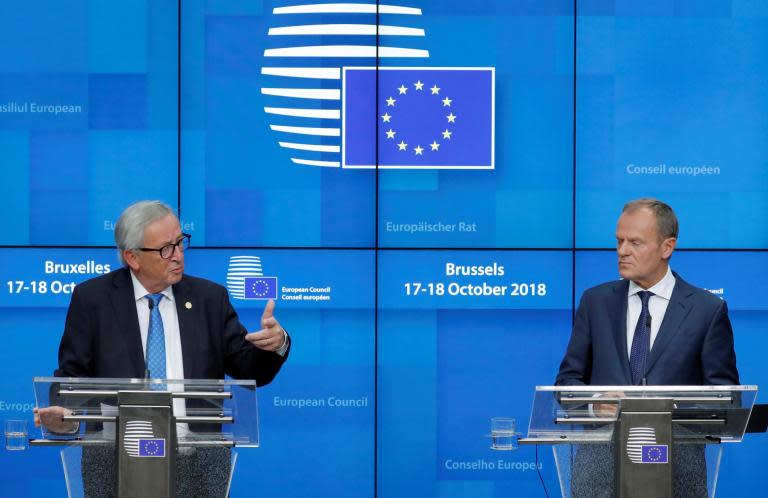Donald Tusk and Jean Claude Juncker signal EU ready to accept longer Brexit transition period
The European Union’s two most senior officials have said any UK request for an extension to the Brexit transition period would be considered “positively” and likely be accepted.
Commission President Jean Claude Juncker said that a longer transition was “probable” while Council President Donald Tusk pointed out that a two-year period had already been accepted in principle by the 27 EU countries.
It comes after Theresa May signalled on Thursday that she would consider extending the transition to allow more time for UK and EU negotiators to solve problems around post-Brexit relations, in particular on the Irish border.
Speaking at the end of a summit in Brussels, Mr Juncker said: “This prolongation of the transition period probably will happen, it’s a good idea.
“It’s not the best idea, the two of us, that we’ve had, but I think that this is giving us some room to prepare the future relationship in the best way possible.”
Mr Tusk pointed out that a longer transition had not been discussed by the leaders of the EU 27 countries at the summit in Brussels.
But he went on: “Let me recall that in her Florence speech in September 2017 Prime Minister May proposed a transition period of around two years, and the EU accepted this proposal unanimously.
“Therefore if the UK decided that an extension of the transition would be helpful to reach a deal, I’m sure the leaders would be ready to consider this positively.”
Speaking directly after the two leaders, however, Theresa May appeared to simultaneously suggest she was open and not open to extending the transition period as a solution to the Northern Ireland border issue.
“We negotiated that the implementation period would end at the end of December 2020,” she told reporters at her own press conference.
“What has now emerged is the idea that an option to extend the implementation period could be a further solution to this issue of the backstop in Northern Ireland. What we are not doing – we are not standing here proposing an extension to the implementation period.
“What we are doing is working to ensure we have a solution the backstop in Northern Ireland, which is currently a blockage to completing the deal, that enables us to get on with completing the deal that delivers on the vote of the British people and is good for the future of the UK.”
Ms May’s cryptic answer could be a response to disquiet in her party about the plans. The period – during which the UK would stay completely tied to EU rules without any say on them – is hugely unpopular with Brexiteers, who believe it would make Britain a “vassal state” of the bloc.
On Wednesday evening Antonio Tajani, the European Parliament president, told reporters the prime minister had “mentioned the idea of an extension of a transition period as one possibility that is on the table and would be looked into” in a meeting with him and the 27 EU leaders.
Other Brussels sources confirmed to The Independent that the PM had also raised the policy in bilateral meetings with top EU officials, and that British negotiators had been sounding out the possibility of extending it in negotiations for “months”.
At the close of the meeting, chief negotiator Michel Barnier said any Brexit ”must include a solid, all-weather backstop” – a signal a longer transition could not be a replacement for agreeing a backstop.
The transition period as currently negotiated would begin when Britain leaves the EU on 29 March 2019 and continue until the first day of 2021. During it practically nothing would change for the UK – Britain would continue to implement all EU law, stay in the single market and customs union and under the jurisdiction of the European Court of Justice.
The UK would however not be represented in EU institutions like the parliament, council, and commission and would therefore have no say in drawing up the rules.
“A further idea that has emerged – and it is an idea at this stage – is to create an option to extend the implementation period for a matter of months – and it would only be for a matter of months,” the prime minister told reporters on the summit’s doorstep as she arrived on Thursday morning.

 Yahoo News
Yahoo News 

